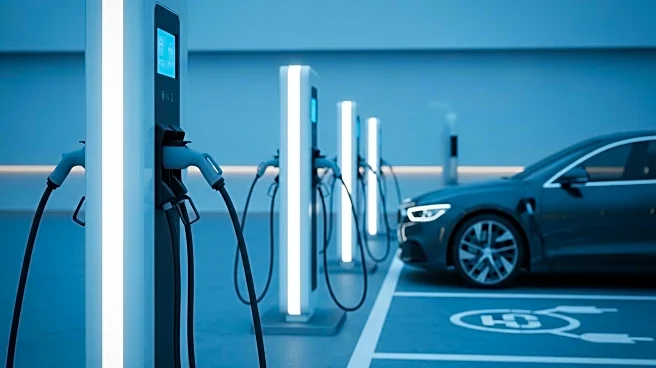What's Happening?
Tesla has historically benefited from government incentives, including the $7,500 electric vehicle (EV) tax credit, which significantly reduced the cost of its vehicles. This credit, part of the Inflation Reduction Act, expired on September 30, 2025, leading to a surge in EV sales prior to its expiration. Tesla, which has seen its stock approach all-time highs, faces challenges as its vehicle unit sales and automotive revenue have declined. The expiration of the tax credit is expected to impact Tesla's sales, with research predicting a potential drop in EV sales by 16% to 38%. CEO Elon Musk has expressed concerns over high-interest rates affecting car affordability, further complicating Tesla's market position.
Why It's Important?
The expiration of the EV tax credit is significant for Tesla and the broader EV market. Tesla, a major player in the industry, could see reduced competitiveness as the credit made its vehicles more affordable. The removal of this incentive may shift consumer preferences back to internal combustion engine vehicles, benefiting the oil and gas industry. Additionally, Tesla's loss of the Corporate Average Fuel Economy compliance credit, which contributed significantly to its revenue, poses further financial challenges. These developments could affect Tesla's profitability and market strategy, influencing investor sentiment and the company's stock performance.
What's Next?
Tesla may need to adjust its pricing strategy to maintain competitiveness without the tax credit. The company could explore cost-cutting measures or innovations to enhance vehicle affordability. Musk's recent purchase of Tesla stock and his optimism about future products like the Optimus autonomous robot suggest potential strategic shifts. Investors and stakeholders will be watching Tesla's Q3 earnings and delivery figures closely to assess the impact of these changes. The broader EV market may also see shifts in consumer behavior and industry dynamics as companies adapt to the new regulatory environment.
Beyond the Headlines
The end of the EV tax credit raises questions about the U.S. government's commitment to supporting sustainable transportation. It highlights the tension between promoting green technologies and traditional energy sectors. Tesla's situation underscores the challenges faced by companies reliant on government incentives and the need for strategic resilience. The evolving landscape may prompt discussions on policy frameworks that balance environmental goals with economic interests.









